2019届浙江省杭州市高考命题比赛模拟(十一)英语试卷
- 格式:pdf
- 大小:465.45 KB
- 文档页数:22
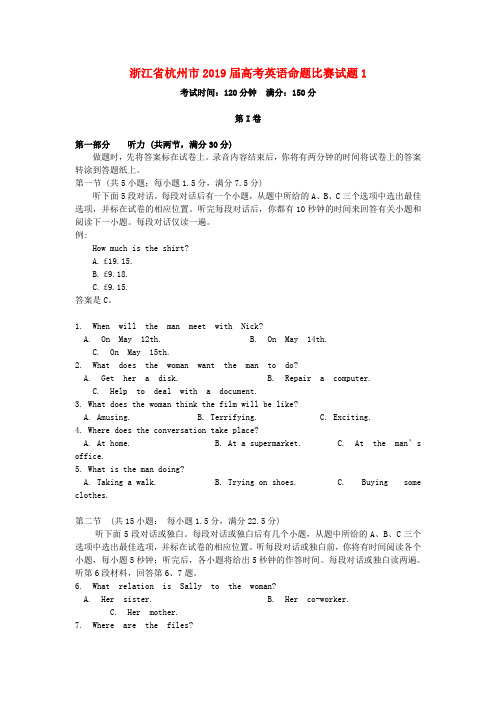
浙江省杭州市2019届高考英语命题比赛试题1考试时间:120分钟满分:150分第I卷第一部分听力 (共两节,满分30分)做题时,先将答案标在试卷上。
录音内容结束后,你将有两分钟的时间将试卷上的答案转涂到答题纸上。
第一节 (共5小题;每小题1.5分,满分7.5分)听下面5段对话。
每段对话后有一个小题,从题中所给的A、B、C三个选项中选出最佳选项,并标在试卷的相应位置。
听完每段对话后,你都有10秒钟的时间来回答有关小题和阅读下一小题。
每段对话仅读一遍。
例:How much is the shirt?A.£19.15.B.£9.18.C.£9.15.答案是C。
1. When will the man meet with Nick?A. On May 12th.B. On May 14th.C. On May 15th.2. What does the woman want the man to do?A. Get her a disk.B. Repair a computer.C. Help to deal with a document.3. What does the woman think the film will be like?A. Amusing.B. Terrifying.C. Exciting.4. Where does the conversation take place?A. At home.B. At a supermarket.C. At the man’s office.5. What is the man doing?A. Taking a walk.B. Trying on shoes.C. Buying some clothes.第二节(共15小题;每小题1.5分,满分22.5分)听下面5段对话或独白。
每段对话或独白后有几个小题,从题中所给的A、B、C三个选项中选出最佳选项,并标在试卷的相应位置。
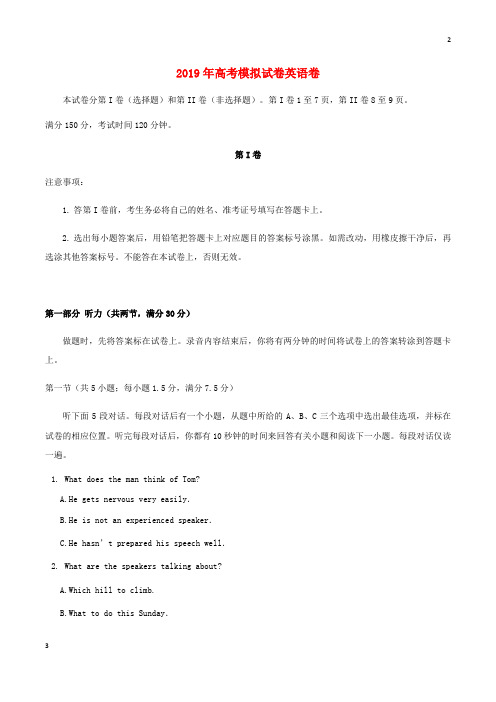
2019年高考模拟试卷英语卷本试卷分第I卷(选择题)和第II卷(非选择题)。
第I卷1至7页,第II卷8至9页。
满分150分,考试时间120分钟。
第I卷注意事项:1.答第I卷前,考生务必将自己的姓名、准考证号填写在答题卡上。
2.选出每小题答案后,用铅笔把答题卡上对应题目的答案标号涂黑。
如需改动,用橡皮擦干净后,再选涂其他答案标号。
不能答在本试卷上,否则无效。
第一部分听力(共两节,满分30分)做题时,先将答案标在试卷上。
录音内容结束后,你将有两分钟的时间将试卷上的答案转涂到答题卡上。
第一节(共5小题;每小题1.5分,满分7.5分)听下面5段对话。
每段对话后有一个小题,从题中所给的A、B、C三个选项中选出最佳选项,并标在试卷的相应位置。
听完每段对话后,你都有10秒钟的时间来回答有关小题和阅读下一小题。
每段对话仅读一遍。
1.What does the man think of Tom?A.He gets nervous very easily.B.He is not an experienced speaker.C.He hasn’t prepared his speech well.2.What are the speakers talking about?A.Which hill to climb.B.What to do this Sunday.C.How to get weather information.3.How is the man going home?A.By bus.B.By car.C.On foot.4.Where does the conversation take place?A.In the library.B.In the classroom.C.In the bookstore.5.When will the headmaster come back?A.9:30.B.11:45.C.12:40.第二节(共15 小题;每小题1.5 分,满分22.5 分)听下面5 段对话或独白。
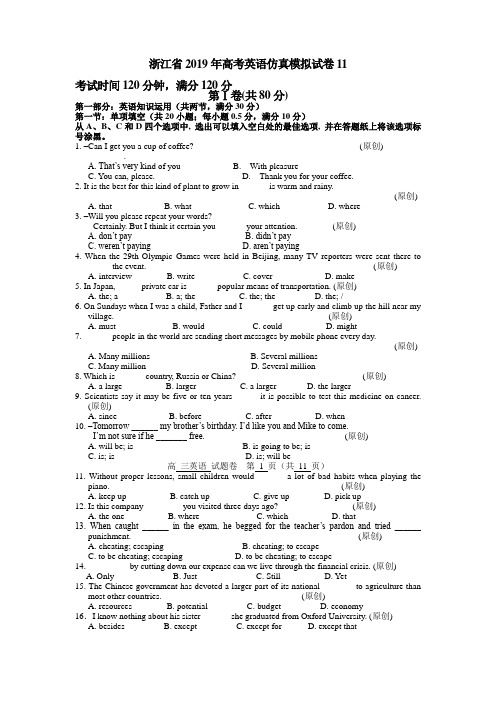
浙江省2019年高考英语仿真模拟试卷11考试时间120分钟,满分120分第Ⅰ卷(共80分)第一部分:英语知识运用(共两节,满分30分)第一节:单项填空(共20小题;每小题0.5分,满分10分)从A、B、C和D四个选项中, 选出可以填入空白处的最佳选项, 并在答题纸上将该选项标号涂黑。
1. –Can I get you a cup of coffee? (原创)- _______.A. That’s very k ind of youB. With pleasureC. You can, please.D. Thank you for your coffee.2. It is the best for this kind of plant to grow in ______ is warm and rainy.(原创)A. thatB. whatC. whichD. where3. –Will you please repeat your words?- Certainly. But I think it certain you ______ your attention. (原创)A. don’t payB. didn’t payC. weren’t payingD. aren’t paying4. When the 29th Olympic Games were held in Beijing, many TV reporters were sent there to ______ the event. (原创)A. interviewB. writeC. coverD. make5. In Japan, _____ private car is ______ popular means of transportation. (原创)A. the; aB. a; theC. the; theD. the; /6. On Sundays when I was a child, Father and I ______ get up early and climb up the hill near myvillage. (原创)A. mustB. wouldC. couldD. might7. ______ people in the world are sending short messages by mobile phone every day.(原创)A. Many millionsB. Several millionsC. Many millionD. Several million8. Which is ______ country, Russia or China? (原创)A. a largeB. largerC. a largerD. the larger9. Scientists say it may be five or ten years _____ it is possible to test this medicine on cancer.(原创)A. sinceB. beforeC. afterD. when10. –Tomorrow ______ my brother’s birthday. I’d like you and Mike to come.- I’m not sure if he _______ free. (原创)A. will be; isB. is going to be; isC. is; isD. is; will be高三英语试题卷第 1 页(共11 页)11. Without proper lessons, small children would ______ a lot of bad habits when playing thepiano. (原创)A. keep upB. catch upC. give upD. pick up12. Is this company ________ you visited three days ago? (原创)A. the oneB. whereC. whichD. that13. When caught ______ in the exam, he begged for the teacher’s pardon and tried ______punishment. (原创)A. cheating; escapingB. cheating; to escapeC. to be cheating; escapingD. to be cheating; to escape14. _________ by cutting down our expense can we live through the financial crisis. (原创)A. OnlyB. JustC. StillD. Yet15. The Chinese government has devoted a larger part of its national _______ to agriculture thanmost other countries. (原创)A. resourcesB. potentialC. budgetD. economy16.I know nothing about his sister ______ she graduated from Oxford University. (原创)A. besidesB. exceptC. except forD. except that17. Although the teacher didn’t mention any names, everybody in the class knew who he was________. (原创)A. attending toB. turning toC. referring toD. talking to18. The teacher’s explanation will help make the text easy _______. (原创)A. to understandB. to be understoodC. understoodD. understanding19. The teacher will give a present to ______ who can get first in this examination. (2019年全国高考上海卷第26题改编)A. bothB. othersC. anyoneD. another20. –Sorry to have knocked you down.- ________. You didn’t mean to, did you? (原创)A. Forget it.B. No problem.C. All right.D. Don’t say so.第二节:完形填空(共20小题;每小题1分,满分20分)阅读下面短文,掌握其大意,然后从21~40 各题所给的四个选项(A、B、C和D)中,选出最佳选项,并在答题纸上将该选项标号涂黑。

浙江省杭州市2019年高考模拟试卷(高考命题比赛)英语试题4本试卷分第I卷(选择题)和第II卷(非选择题)。
第I卷1至7页,第II卷8至9页。
满分150分,考试时间120分钟。
第I卷注意事项:1.答第I卷前,考生务必将自己的姓名、准考证号填写在答题卡上。
2.选出每小题答案后,用铅笔把答题卡上对应题目的答案标号涂黑。
如需改动,用橡皮擦干净后,再选涂其他答案标号。
不能答在本试卷上,否则无效。
第一部分听力(共两节,满分30分)做题时,先将答案标在试卷上。
录音内容结束后,你将有两分钟的时间将试卷上的答案转涂到答题卡上。
第一节(共5小题;每小题1.5分,满分7.5分)听下面5段对话。
每段对话后有一个小题,从题中所给的A、B、C三个选项中选出最佳选项,并标在试卷的相应位置。
听完每段对话后,你都有10秒钟的时间来回答有关小题和阅读下一小题。
每段对话仅读一遍。
1.What does the man think of Tom?A.He gets nervous very easily.B.He is not an experienced speaker.C.He hasn’t prepared his speech well.2.What are the speakers talking about?A.Which hill to climb.B.What to do this Sunday.C.How to get weather information.3.How is the man going home?A.By bus.B.By car.C.On foot.4.Where does the conversation take place?A.In the library.B.In the classroom.C.In the bookstore.5.When will the headmaster come back?A.9:30.B.11:45.C.12:40.第二节(共15 小题;每小题1.5 分,满分22.5 分)听下面5 段对话或独白。
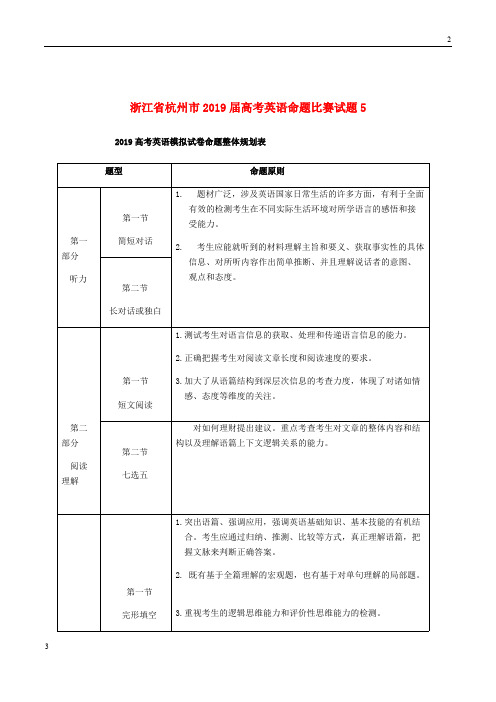
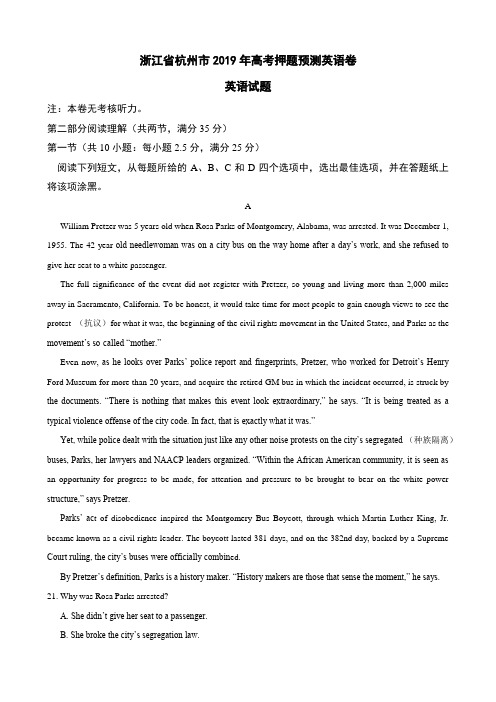
浙江省杭州市2019年高考押题预测英语卷英语试题注:本卷无考核听力。
第二部分阅读理解(共两节,满分35分)第一节(共10小题:每小题2.5分,满分25分)阅读下列短文,从每题所给的A、B、C和D四个选项中,选出最佳选项,并在答题纸上将该项涂黑。
AWilliam Pretzer was 5 years old when Rosa Parks of Montgomery, Alabama, was arrested. It was December 1, 1955. The 42-year-old needlewoman was on a city bus on the way home after a day’s work, and she refused to give her seat to a white passenger.The full significance of the event did not register with Pretzer, so young and living more than 2,000 miles away in Sacramento, California. To be honest, it would take time for most people to gain enough views to see the protest (抗议)for what it was, the beginning of the civil rights movement in the United States, and Parks as the movement’s so-called “mother.”Even now, as he looks over Parks’ police report and fingerprints, Pretzer, who worked for Detroit’s Henry Ford Museum for more than 20 years, and acquire the retired GM bus in which the incident occurred, is struck by the documents. “There is nothing that makes this event look extraordinary,” he says. “It is being treated as a typical violence offense of the city code. In fact, that is exactly what it was.”Yet, while police dealt with the situation just like any other noise protests on the city’s segregated (种族隔离)buses, Parks, her lawyers and NAACP leaders organized. “Within the African American community, it is seen as an opportunity for progress to be made, for attention and pressure to be brought to bear on the white power structure,” says Pretzer.Parks’ ac t of disobedience inspired the Montgomery Bus Boycott, through which Martin Luther King, Jr. became known as a civil rights leader. The boycott lasted 381 days, and on the 382nd day, backed by a Supreme Court ruling, the city’s buses were officially combin ed.By Pretzer’s definition, Parks is a history maker. “History makers are those that sense the moment,” he says.21. Why was Rosa Parks arrested?A. She didn’t give her seat to a passenger.B. She broke the city’s segregation law.C. She led the Montgomery Bus Boycott.D. She offended the authority of the police.22. Rosa Parks can be described as_______.A. a history document makerB. a movement leaderC. a brave motherD. a civil rights pioneer23. What is the text mainly about?A. The act of Rosa Parks gave rise to a movement.B. Pretzer witnessed the outbreak of the bus boycott.C. The Montgomery protest ended the segregation law.D. Martin Luther King led the civil right movement.BHundreds of thousands of hearing-impaired people in the United States rely on American sign language for communication. But popular as it is, there are millions of people with normal hearing that are unable to figure out the hand and finger gestures. That may change soon thanks to the clever “SignAloud” glove that transforms sign language into speech.The gloves are the brainchild of Thomas and Azodi. The inventors are firm believers that the ability to communicate is a fundamental human right and that those unable to hear or speak, face a significant disadvantage in life. But though there have been many attempts to bridge the communications gap, the solutions are simply too awkward to be operated on a large scale.The lightweight and comfortable SignAloud glove is equipped with a series of sensors that measure the movement and position of the hands as a person is signing. A Bluetooth device sends the information to a computer, which tries to match the gesture with a one in its database. As soon as the exact match is located, it “speaks” the relevant words or phrase through a speaker.Though still in prototype phase(原型阶段), the gloves seem to have impressed even the experts. On April 12, it won the inventors the outstanding Student Prize. Founded by Massachusetts Institute of Technology in 1994, the award that comes with a $10,000 USD cash prize, celebrates collegiate students whose inventions have the potential to impact key areas of the global economy. University students can submit entries in one of four categories: “Cure it!”,“Drive it!”, “Eat it!” or “Use it!.”Pryor and Azodi won top honors in the "Use it" category which recognizes technology-based inventions that have the potential to improve consumer products. In addition to using the glove to enable the hearing impaired to communicate more efficiently, the inventors fancy several other commercial applications. These include usingthem to teach ASL language as well as for communicating with patients recovering from weakening illnesses.28. Why did the inventors see a need for the SignAloud glove?A. Today hundreds of thousands of people in the United States are hearing-impaired.B. Many people with good hearing have difficulty in learning American sign language.C. The hearing-impaired and those with normal hearing have a communication barrier.D. There is an urgent need to change the medical conditions of the hearing-impaired.29. In Paragraph 3, the author tries to tell us_______.A. how the SignAloud glove worksB. where the SignAloud glove is placedC. why the SignAloud glove wears easilyD. what the SignAloud glove is made up of30. It can be inferred from the text that_______.A. the invention is unfit to use on a large scale because of its costB. those submitting entries can win the outstanding student prizeC. hearing-impairment will be cured very soon with the inventionD. the two students expect their invention to come onto the marketCWhen we look at a lovely baby, a puppy or a rally cute kitten many of us want to squeeze it. Why is that?According to a study published in the journal Frontiers in Behavioral Neuroscience, it’s a typical experience of “cute aggression”. The experience results from the fight between the brain’s “emotion system”, which impels (驱使) people to squeeze cute things, and its “reward system” which deals with feelings of “wanting”.In the study, 54 participants between the ages of 18 and 40 were presented with four groups of photos. Two of the groups of photos were of cute human babies and animals and the other two were of less adorable adult humans and animals. As the participants looked at the photos, there searchers watched their brain activities.According to the researchers, the participants reward systems were found to be active asthey looked at the cute babies, and they seemed to be overwhelmed(征服的). By contrast, the reward systems of the people looking at the less cute adults were found to be inactive, and they seemed to be less impelled by their reward systems.This suggests that cute things activate their emotion systems in such a way that people are overwhelmedby the experience of cuteness. But reward systems work against these emotions by creating the desire to protect cute things.As Katherine Stavropoulos, the lead researcher of this study at the University of California in the US told Science Alert, “The cute aggression is the brain’s way of ‘bringing us back down’ by balancing our feelings of being overwhelmed.”Stavropoulos compared this process of balancing to an evolutionary adaptation. Such an adaptation may have taken place to ensure that people are able to continue taking care of creatures they consider particularly cute.So, although cute babies and adorable animals may look completely helpless, their vulnerable( 易受伤害的) appearance may in fact help them to survive.27. According to the text, “cute aggression” refers to .A. the emotion of wanting to protect cute thingsB. the task of emotion system and reward systemC. the adaptation of consistently taking care of cute creaturesD. the behavior of squeezing a cute baby or animal when seeing it28. In nature, “cute aggression” is caused by .A. the need of the brain to balance all feelingsB. the photos of cute human babies and animalsC. the vulnerable appearance of babies or animalsD. the conflict between emotion system and reward system29. Which of the following statements about the study is TRUE?A. Facial expressions of the participants were observed.B. Katherine Stavropoulos conducted this study on her own.C. Cute babies and animals affected brain activities of all the participants.D. The participants were divided into two groups in order to make comparison.30. What is the author's purpose in writing this text?A. To persuade readers to protect cute animals.B. To stress the significance of cute aggression.C. To present research findings on cute aggression.D. To share an interesting phenomenon with readers第二节(共5小题:每小题2分計满分10分)根据短文内容,从短文后的选项中选出能填入空自处的最佳选项。
新高考●浙江省依据《全国考试说明》(高考综合改革实验省份试用)命题————————————————————————————·体验高考·锤炼心态2019年中学教师新课程教学质量检测卷命题比赛参赛试卷细致 严谨 规范——————————————————————— 双向命题CONTENTS1.命题整体规划表 ◎题型 ◎命题原则2.完形填空与阅读素材解读表3.命题双向细目表4.模拟试卷5.参考答案(P3) (P4-6)(P7-9) (P10-17) (P18-23)2019高考英语模拟试卷命题整体规划表2019高考英语模拟试卷完形、阅读素材解读表表一:本卷对完形填空素材长度及词汇的整理表二:本卷对阅读素材长度及词汇的整理(依据:2018年考试说明对阅读理解的要求是:3篇短文的阅读量为总长度不少于800词。
)表三:近三次浙江高考卷与本卷之间的题材对比表四:近三次浙江高考卷与本卷完形填空之间的词类分析比较命题双向细目表(一)阅读理解命题双向细目表(二)完形填空命题双向细目表(三)语法填空考点分布应用文写作概要2019年高考模拟试卷英语卷时间120分钟分值150分本试卷分第I卷(选择题)、第II卷(非选择题)。
考试结束,将本试卷和答题卡一并交回。
第 I 卷注意事项:1. 答第Ⅰ卷前,考生务必将自己的姓名、准考证号填写在答题卡上。
2.选出每小题答案后,用铅笔把答题卡上对应题目的答案标号涂黑。
如需改动,用橡皮擦干净后,再选涂其他答案标号。
不能答在本试卷上,否则无效。
第一部分:听力(共两节,满分30分)选自《听力考场高考英语》做题时,先将答案标在试卷上。
录音内容结束后,你将有两分钟的时间将试卷上的答案转涂到答题卡上。
第一节(共5小题;每小题1.5分,满分7.5分)听下面5段对话。
每段对话后有一个小题,从题中所给的A、B、C三个选项中选出最佳选项,并标在试卷的相应位置。
听完每段对话后,你都有10秒钟的时间来回答有关小题和阅读下一小题。
浙江省杭州市2019届高考英语命题比赛试题22019高考英语模拟卷命题双向细目表第三部分语言运用第一节:完形填空第二节:语法填空第三部分:书面表达第一节:应用文写作2019年高考模拟试卷英语卷考生须知:1.本卷满分150分, 考试时间120分钟;2.答题前, 在答题卷密封区内填写班级、学号、姓名、试场座位号。
3.所有答案必须写在答题卷上, 写在试卷上无效;4.考试结束后, 只需上交答题卷。
第一卷第一部分:听力(共两节, 满分30分)第一节(共5小题, 每小题1.5分, 满分7.5分)听下面5段对话。
每段对话后有一个小题, 从题中所给的A、B、C三个选项中选出最佳选项, 并标在试卷的相应位置。
听完每段对话后.你都有10秒钟的时间来回答有关小题和阅读下一小题。
每段对话仅读一遍。
1. What transportation will the speakers choose to take?(原创https:///TVpAq4iG)A. TaxiB. BusC. Subway2. How much will the woman pay for her dress?(原创https:///KRpZqlDH)A. $200B. $160C.$403. Where does the conversation probably take place?(原创https:///ICNuacr4)A. SubwayB. DowntownC. Tourist center4. What does the woman mean?(原创/thread-415239-1-1.html)A. Ted should have a try.B. Ted will lose the chance.C. Ted needs more organization skills.5. How do they feel?(原创https:///4LyZ57lV)A. TolerantB. ImpatientC. Uneasy第二节(共15小题;每小题1.5分, 满分22.5分)听下面5段对话或独白。
2019年高考英语模拟试卷试卷满分:150分考试时间:120分钟第一部分听力(共两节,满分30分)做题时,先将答案标在试卷上。
录音内容结束后,你将有两分钟时间将试卷上的答案转涂到答题纸上。
第一节(共5小题;每小题1.5分,满分7.5分)1.What’s the date today?A. May 30thB. May 31stC. June 1st2. Where was the boy last Monday?A. In his schoolB. In EuropeC. In China3. How much does one adult ticket cost?A. 60 dollarsB. 40 dollarsC. 30 dollars4. What does the woman think of the roast duck?A. GreatB. BadC. Just so-so5. What does the man mean?A. He is not the one to blame.B. He will be responsible for it.C. He will be more careful next time.第二节(共15小题;每小题1.5分,满分22.5分)听下面5段对话或独白。
每段对话或独白后有几个小题,从题中所给的A、B、C 三个选项中选出最佳选项,并标在试卷的相应位罝。
听每段对话或独白前,你将有时间阅读各个小题,每小题5秒钟;听完后,各小题将给出5秒钟的作答时间。
每段对话或独白读两遍。
听下面一段对话,回答第6和第7题。
6. Where does this conversation take place?A. On a planeB. In a restaurantC. In a hotel7. What will the woman bring to the man’s son?A. Warm waterB. Hot coffeeC. Orange juice听下面一段对话,回答第8至第10题。
2019年高考模拟试卷英语卷第一卷第一部分听力(共两节,满分30分)(改编自高三期初考试试卷)第一节(共5小题;每小题1.5分,满分7.5分)听下面5段对话。
每段对话后有一个小题,从题中所给的A、B、C三个选项中选出最佳选项,并标在试卷的相应位置,听完每段对话后,你都有10秒钟的时间,有关小题和阅读下一小题。
每段对话仅读一遍。
1.Who repaired the computer?A. Tom.B. Jack.C. Pam.2. What does Tom do probably?A. a barman.B. A shopkeeper.C. a waiter.3. When will the woman go back to work?A. at 1:00 pm.B. at 1:15 pm.C. at 1:30 pm.4. What is the wo man’s problem?A. She’s always late.B. She wastes too much time.C. She spends too much money.5. What will the man do afterwards?A. Put away his clothes.B. Buy another closetC. Throw his old clothes away.第二节(共15小题;每小题1.5分,满分22.5分)听下面5段对话或独白。
每段对话或独白后有2至4个小题,从题中所给的A、B、C三个选项中选出最佳答案,并标在试卷的相应位置。
听每段对话或独白前,你将有5秒种的时间阅读各小题;听完后,各小题将给出5秒钟的作答时间。
每段对话或独白读两遍。
听下面一段对话,回答第6至第7题6. When does Lucy bite her nails?A. When she’s sad.B. When she’s excited.C. When she’s nervous.7. What will the speakers do next?A. Watch a video.B. Play games.C. Visit a website.听下面一段对话,回答第8至第9题8. What are the speakers talking about?A. How to improve our brain.B. How to keep young.C. How to practice muscles.9. What’s the woman’s suggestions?A. Join in more activities.B. Slow down the life speed.C. See a doctor.听下面一段对话,回答第10至第12题10. How does the man feel every morning?A. Sleepy.B. Busy.C. Relaxed.11. What time does the man usually get up?A. At about 7:00B. At about 8:00C. At about 9:00\12. What are the speakers going to do?A. Go to work.B. Have lunch.C. Choose clothes.听下面一段对话,回答第13至第16题13. Where are the speakers?A. In Britain.B. In Germany.C. In France.14. What does the woman do in most working hours?A. She handles daily affairs.B. She deals with e-mails.C. She manages the telephones.15. When does the woman usually get off work?A. At 5:15 pm.B. At 4:30 pmC. At 4:15 pm.16. What is the woman?A. A secretary.B. A directorC. An engineer.听下面一段独白,回答第17至第20题17. How can you get ready for dancing?A. Have enough food.B. Stretch your body.C. Have a good rest.18. What does the speaker say about ballet?A. It’s very hard to learn.B. It’s very relaxing.C. It’s much free19. How many kinds of dances are mentioned?A. Three.B. Four.C. Five.20. Which is the most favorable dance?A. Ballet.B. Jazz.C. Hip-hop第二部分:阅读理解(共两节,满分35分)第一节(共10小题;每小题2.5分,满分25分)阅读下列短文,从每题所给的A、B、C和D四个选项中,选出最佳选项,并在答题纸上将该项涂黑。